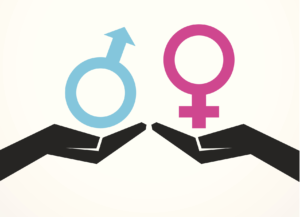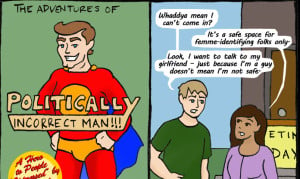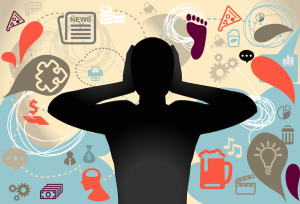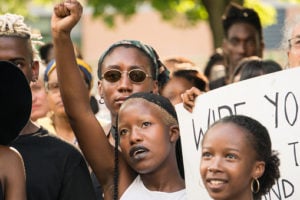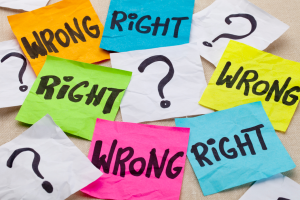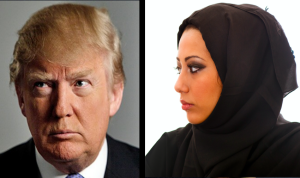
A person stands with their arms crossed in an office lined with books.
“Why complain about the wage gap when women in this other far-away country can’t even work?”
“Oh, please. You think your reproductive rights are being trampled? In this other country, people die from childbirth because they don’t even have hospitals!”
“Again with the gender neutral bathrooms? In this place, people who identify as trans are murdered!”
We get it. There are a lot of horrible things happening all over the world, including the United States.
But the issue here is that trying to tell people they can’t be angry about their oppression because others may be more oppressed is not activism. This is derailing.
I personally think it’s a positive sign when people are aware of human rights injustices and are invested in changing them. But when that comes at the expense of belittling another person’s personal struggles, I no longer think that’s useful.
As humans, we love to categorize things and then put them into hierarchies – and feminism is not exempt from that. I find that whenever I discuss topics that seem trivial compared to extreme acts of violence, well-meaning (and not so well-meaning) people often remind me that there are terrible things happening elsewhere.
And this is true.
But I want to shed some light on the false idea that there is any such thing as a “trivial” feminist cause.
Because while there may be causes that affect some more than others or that are more explicitly violent than others, feminism isn’t about taking a stand for every single cause. It’s about allowing marginalized people to dictate how issues relating to them are discussed and addressed – and recognizing that all forms of violence, big or supposedly small, are tied to the same larger issues.
So here are five reasons why, whether it’s an issue you consider valuable or not, “first-world” feminism is not trivial.
1. Feminist Activism Isn’t One-Size-Fits-All
Feminism isn’t a movement with one single goal, but rather, a series of movements dealing with different types of oppression across many identities.
In fact, treating feminism as if it were only about women results in the deliberate erasure of women who are oppressed due to race, ethnicity, class, and/or sexual orientation, among many other identities, including trans women. This also erases non-binary people.
The reality is that it’s entirely plausible for one person to write about an important and life-threatening issue or experience, while also writing about dating and makeup.
That’s what it means to be human: It means our lives aren’t one-dimensional, and we’re allowed to be really pissed about one thing and mildly annoyed about another.
And because all of those issues affect our daily life in various ways, we absolutely have every right to talk about it.
I’ll use myself as an example.
As a Latina who is also an immigrant and was raised in poverty, I am disproportionately disenfranchised in a society that caters to white Americans of means.
But I’m also college-educated, light-skinned, and able-bodied, which puts me in a privileged position. Kat Lazo breaks this idea down really well in this video.
Because of my personal intersecting identities, I can write about serious issues like immigration reform and gentrification, and also about sex and relationships.
It’s perfectly fine to be very passionate about one issue – or to want to cover many issues in your feminism. But it’s not okay to pretend that one issue is beyond another for everyone.
Also, trying to police what is a feminist issue and what isn’t is oppressive – which brings me to my next point.
2. Patterns of Oppression Dictate Who Gets to Talk About an Issue
“But what about women in Saudi Arabia?!”
Oh, if we only had a penny for every time that question came up!
I get it. Dealing with street harassment during your commute sure beats not being able to leave your home, but what problems are solved by pointing out that there are women living under other types of oppression?
Derailing a conversation about street harassment in public spaces to talk about how Saudi women can’t even leave their homes without a male guardian does nothing for those of us dealing with street harassment on a daily basis – or for women who are infantilized by their government.
Moreover, derailing is always done at the expense of supposedly more oppressed people, who are usually Black and Brown.
This reinforces white supremacy and the status quo, and sets up a hierarchy of us (the liberated modern people) and them (the backwards and oppressed people).
It dismisses the person sharing their own experiences and results in the silencing of those most impacted by not being able to share their own stories.
Whether or not one believes that there are more important issues, only those affected by them directly should be spearheading any conversation on that topic.
For example, it wouldn’t be proper for me to talk about Muslim women and the veil.
I don’t practice Islam, I was not raised in a culturally or religiously Muslim household, and I have never worn a head veil. There is nothing about my identity, upbringing, or lifestyle that makes me an expert in the lives of Muslim women, except that that we identify as women.
What I can do is listen more than I talk.
My opinion is not valuable when it comes to marginalized groups that I do not belong to. But I can use my privilege and platform to direct the conversation toward promoting the writing and activism of other feminists.
I can promote and support causes that affect others without centralizing myself in the conversation.
Using the lived experiences of others to play devil’s advocate is dismissive and angering.
3. Anything That Impacts Our Daily Existence Is Worthy of Anger
Seemingly harmless acts of oppression have a detrimental domino effect on our daily lives.
Most of the derailing I experience comes as a result of sharing stories of street harassment:
“Sometimes a compliment is just a compliment.”
“Why can’t you just say ‘thank you’ and keep walking?”
“I wish people would compliment me on a daily basis.”
If only street harassment was really about men telling us how much they like our cute new shoes!
Catcalling is about dominating public spaces and asserting power over another. It’s a way of controlling what we do with our bodies and who gets to enjoy them.
It is infuriating and upsetting when it happens occasionally, but it can escalate to physical violence or death. If the only outcome is that our confidence is shattered, that’s actually the best-case scenario.
We take different paths to avoid groups of harassers. We pay for taxis instead of walking alone. Sometimes, we refuse to go out during certain times and avoid some places altogether.
And for those of us who are women of color, the exotification of our bodies is so widespread that we deal with racialized sexual harassment in the streets and in our workplaces.
It isn’t trivial to us.
Suggesting that first-world problems are unimportant misses the connection between how commonplace things have massive impact on our daily lives.
4. We Can’t Be Experts in All Types of Feminism
There are groups and individuals worldwide doing amazing work to end gender-based violence and disenfranchisement.
Whether your activism is about veganism and animal rights, reproductive justice, Muslim women, immigration reform, domestic workers, sex trafficking, transgender rights, disability justice, or something else, you will find a group working for those rights.
By assuming that feminists fighting for “first-world” problems aren’t doing enough about “real” gender-based violence, you’re actually belittling the work being done by other groups.
And if there isn’t a group or individual doing anything about an issue that matters to you, you can start the conversation.
Of course, privilege has an effect on what issues are noticed and which ones get the most media attention. A well-funded group of women in the US, Canada, or Europe are much more likely to be able to attend conferences and get a large backing for their cause.
I often get frustrated at prominent feminist groups who don’t discuss issues in an intersectional manner because it sends the message that we’re all oppressed equally – and that any justice for the most privileged groups will trickle down to marginalized individuals.
It’s understandable that we would be angered by this, but the anger has to be directed at the right place.
I don’t want a privileged person talking about issues that affect my community. Rather, I want the same opportunities so that my community can also have a platform to share their stories and activism.
Feminist topics of discussion are plenty, and the idea that there is limited space to discuss them is false.
Who gets to share their stories is largely based on a hierarchical structure that values some individuals over others.
It’s hypocritical to speak of caring about feminist issues in the developing world, but not do the research to learn about groups and individuals fighting for these causes.
If you really care, support them – and give them a platform when they need it the most.
5. Dismantling Oppression Requires Chipping Away at All Things
Systems of oppression don’t exist in a vacuum. They all stem from a racist, heteronormative, patriarchal, and capitalist society that, frankly, will never be fair to marginalized communities.
What may seem like an isolated concern for one individual is often a symptom of a larger problem, inasmuch that catcalling and restricting women’s access to public spaces are, in effect, the same problem at different levels.
Catcalling and other forms of street harassment is about men’s power, and they don’t do it to flirt. It’s about the control of public spaces and the bodies that are allowed to occupy them freely.
The extreme version of street harassment is laws that control women’s bodies and ban them from public spaces.
This analogy can be extended to an even larger context: colonization and power.
Injustices are rooted in our society and culture, and they all have a historical context that can’t be ignored or wished away. Countries that are considered superpowers today, like the United States, have had a hand in the exploitation of other impoverished nations.
There is absolutely no way in which we can rally for the rights of marginalized individuals elsewhere while supporting xenophobic politicians, wars, and colonialism.
Powerful nations like the US exploit our feelings of superiority to make us rally behind causes that destroy nations and further exploits them under the guise of “saving them.”
This is commonly seen in our needless military intervention in Afghanistan, thinly veiled as a rescue mission for oppressed Muslim women.
More recently, the United States supported a coup in Honduras that removed a democratically elected president and propped up a US-backed quasi-government that is systematically assassinating activists.
I don’t believe that the world will ever be perfect for everyone. Marginalized groups will always exist, and do so even today in some of the most egalitarian societies.
Like when people talk about the Netherlands being so progressive, yet they celebrate Christmas with a racist depiction of a Moor called Zwarte Piet, who is usually a white man in exaggerated blackface.
Speaking up, writing, dissenting, and getting angry paves the way for change, but only if we do the work to connect the threads between seemingly benign acts of oppression and more brutal acts of violence.
***
I often joke about my own “first world problems.”
It’s human to sigh at someone complaining about their coffee shop running out of their favorite pastry when there are millions of children worldwide with nothing to eat.
But the truth is that while it’s easy to sigh at pastry-agony, condescension is never the best way to solve any problem.
We can’t be experts in all feminist matters, but we can speak up on the issues that affect us and help promote causes that affect others. And that’s a start.
Fighting to end “first world problems” has no impact, whether positive or negative, on individuals living under more stringent customs and laws.
No activism negates the experience of marginalized communities. The only way they’re marginalized if by their struggles being co-opted.
So whether a cause is about “freeing the nipple” or ending the death penalty, it’s necessary and valuable – and I’m always here for that.
[do_widget id=’text-101′]
Patricia Valoy is a Contributing Writer for Everyday Feminism. She is a Civil Engineer, feminist blogger, and STEM activist living in New York City. She writes about feminist and STEM issues from the perspective of a Latina and a woman in engineering. You can read more of her writings on her blog Womanisms, or follow her on Twitter @besito86. Read her articles here and book her for speaking engagements here.
Search our 3000+ articles!
Read our articles about:
Our online racial justice training
Used by hundreds of universities, non-profits, and businesses.
Click to learn more
Most Read Articles
- « Previous
- 1
- …
- 30
- 31
- 32






